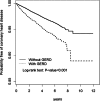Association between gastroesophageal reflux disease and coronary heart disease: A nationwide population-based analysis
- PMID: 27399102
- PMCID: PMC5058831
- DOI: 10.1097/MD.0000000000004089
Association between gastroesophageal reflux disease and coronary heart disease: A nationwide population-based analysis
Abstract
In this study, we aimed to determine the association between gastroesophageal reflux disease (GERD) and subsequent coronary heart disease (CHD) development, if any, and to evaluate whether longer use of proton pump inhibitors (PPIs) increases the risk of CHD.Patients diagnosed with GERD between 2000 and 2011 were identified as the study cohort (n = 12,960). Patients without GERD were randomly selected from the general population, frequency-matched with the study group according to age, sex, and index year, and evaluated as the comparison cohort (n = 51,840). Both cohorts were followed up until the end of 2011 to determine the incidence of CHD. The risk of CHD was evaluated in both groups by using Cox proportional hazards regression models.The GERD patients had a greater probability of CHD than the cohort without GERD did (log-rank test, P < 0.001 and 11.8 vs 6.5 per 1000 person-years). The GERD cohort had a higher risk of CHD than the comparison cohort did after adjustment for age, sex, hypertension, diabetes, hyperlipidemia, alcohol-related illness, stroke, chronic obstructive pulmonary disease, asthma, biliary stone, anxiety, depression, chronic kidney disease, and cirrhosis (adjusted hazard ratio [aHR]: 1.49, 95% confidence interval [CI]: 1.34-1.66). The risk of CHD was greater for the patients treated with PPIs for more than 1 year (aHR = 1.67, 95% CI = 1.34-2.08) than for those treated with PPIs for <1 year (aHR = 1.56, 95% CI = 1.39-1.74).Our population-based cohort study results indicate that GERD was associated with an increased risk of developing CHD, and that PPI use for more than 1 year might increase the risk of CHD.
Conflict of interest statement
The authors have no conflicts of interest to disclose.
Figures
Similar articles
-
Gastroesophageal reflux disease with proton pump inhibitor use is associated with an increased risk of osteoporosis: a nationwide population-based analysis.Osteoporos Int. 2016 Jun;27(6):2117-26. doi: 10.1007/s00198-016-3510-1. Epub 2016 Feb 10. Osteoporos Int. 2016. PMID: 26860609
-
Increased risk of pulmonary tuberculosis in patients with gastroesophageal reflux disease.Int J Tuberc Lung Dis. 2016 Feb;20(2):265-70. doi: 10.5588/ijtld.15.0251. Int J Tuberc Lung Dis. 2016. PMID: 26792483
-
Risk of acute myocardial infarction in patients with gastroesophageal reflux disease: A nationwide population-based study.PLoS One. 2017 Mar 20;12(3):e0173899. doi: 10.1371/journal.pone.0173899. eCollection 2017. PLoS One. 2017. PMID: 28319162 Free PMC article.
-
Expert Recommendations on Optimizing the Diagnosis and Management of Gastroesophageal Reflux Disease Associated with Comorbidities in the Indian Population.J Assoc Physicians India. 2023 Aug;71(8):11-12. doi: 10.59556/japi.71.0269. J Assoc Physicians India. 2023. PMID: 37651248 Review.
-
Effectiveness and safety of proton pump inhibitors in infantile gastroesophageal reflux disease.Ann Pharmacother. 2010 Mar;44(3):572-6. doi: 10.1345/aph.1M519. Epub 2010 Feb 2. Ann Pharmacother. 2010. PMID: 20124466 Review.
Cited by
-
Association between wet-bulb globe temperature with gastroesophageal reflux disease in different geographic regions in a large Taiwanese population study.Sci Rep. 2025 Jul 1;15(1):21339. doi: 10.1038/s41598-025-07073-8. Sci Rep. 2025. PMID: 40596482 Free PMC article.
-
Association Between Gastroesophageal Reflux Disease and Hypertension: A Systematic Review and Meta-Analysis.JGH Open. 2025 Apr 12;9(4):e70158. doi: 10.1002/jgh3.70158. eCollection 2025 Apr. JGH Open. 2025. PMID: 40225100 Free PMC article. Review.
-
Association of self-reported and objective sleep disturbance with the spectrum of gastroesophageal reflux disease.J Clin Sleep Med. 2024 Jun 1;20(6):911-920. doi: 10.5664/jcsm.11028. J Clin Sleep Med. 2024. PMID: 38300823 Free PMC article.
-
Heartburn's Hidden Impact: A Narrative Review Exploring Gastroesophageal Reflux Disease (GERD) as a Cardiovascular Disease Risk Factor.J Clin Med. 2023 Nov 29;12(23):7400. doi: 10.3390/jcm12237400. J Clin Med. 2023. PMID: 38068452 Free PMC article. Review.
-
Prevalence of Gastroesophageal Reflux Disease and Its Impact on the Quality of Life Among Obese Individuals in Al-Baha Region, Saudi Arabia.Cureus. 2024 Jun 24;16(6):e63073. doi: 10.7759/cureus.63073. eCollection 2024 Jun. Cureus. 2024. PMID: 38933342 Free PMC article.
References
-
- Vakil N, van Zanten SV, Kahrlas P, et al. The Montrel definition and classification of gastroesophageal reflux disease: a global evidence-based consensus. Am J Gastroenterol 2006; 101:1900–1920. - PubMed
-
- Chauhan A, Petch MC, Shofield PM. Effect of esophageal acid instillation on coronary artery blood flow. Lancet 1993; 341:1309–1310. - PubMed
Publication types
MeSH terms
Substances
LinkOut - more resources
Full Text Sources
Other Literature Sources
Medical


